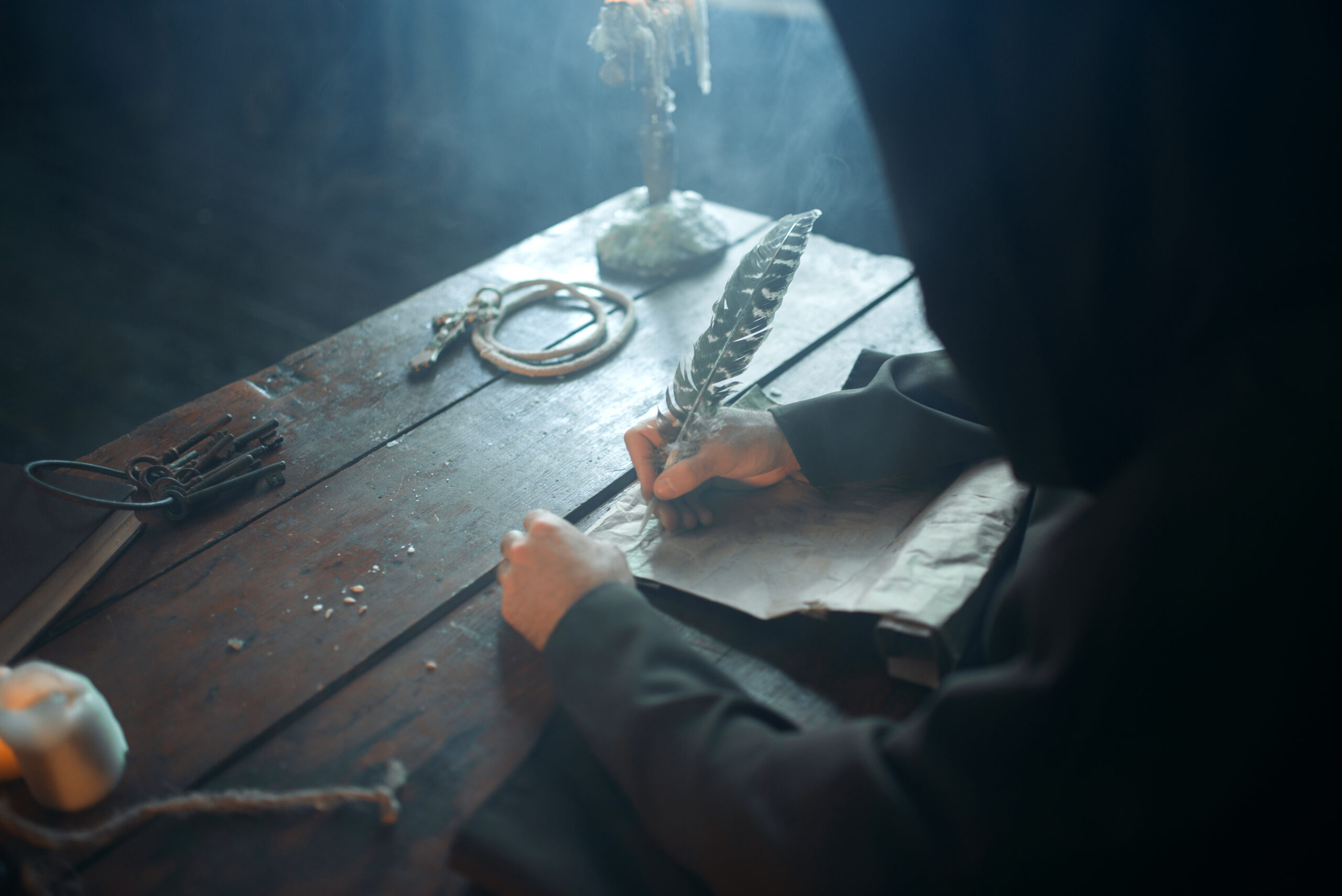Storytelling Tips for RPG Campaigns
7 Golden Rules to Tell the Story No One Will Ever Forget

Dungeon Masters, or simply DMs, are the heart behind every RPG campaign. They share many characteristics with game creators and entertainers, bringing engaging narratives, a fair lot of challenges, and new worlds for players to explore. They organize, through storytelling, the spectacle of an RPG session and serve as minstrels of epic tales. They’re the gods of fictional worlds, capable of deciding what happens with every character, when the call for adventure appears, and where the journey ends. However, with great powers comes great responsibilities, and it is theirs to guarantee that everyone is having fun along the way.
Regardless of the system used for their stories (e.g. D&D, Pathfinder, Tormenta, GURPS, World of Darkness), some things are essential for having a great time and pushing a campaign to the next level. There are tricks to have players sitting at the edge of their chairs, and to keep them hooked until the end of the session. This list is for beginners and veterans alike, to help them focus on what’s important to make their story shine. So get comfortable, grab some snacks, and follow this quest to learn how to create the best RPG campaigns by dominating storytelling.
#1. Show, Don’t Tell
At least once, everyone had a moment that made them think about how they wished to have experienced an event, instead of just hearing about it. It could be a cool battle that happened long ago, far from what’s happening in the plot nowadays, or a character’s backstory that made them look quite impressive, without diving too deep into it.
There are many ways to avoid this, even when players are not physically involved in a scene. Someone in the party can make contact with a source that allows them to relive what happened. Perhaps to a creature from an ancient time. Players tend to feel more rewarded for discovering things that way and it allows them to role-play how their characters felt about that experience.
While some stories are better left untold, be it for the sake of brevity or for hiding a plot point for later, it is a rule of thumb to have players feel they were somehow a part of the events. However, it’s up to DMs to balance it with how the story unfolds and what players should be aware of.
#2. Plan and Improvise
When planning the campaign, remember to create a solid storyline and divide it into arcs. Let players collect themselves between arcs to prepare for what’s to come next, buy new items, and share some thoughts. This helps DMs keep track of the story and adapt its pacing. However, be open to experimenting and improvising! Go off script, and allow players to go a bit off script too. Don’t punish players for trying to take a different path.
Don’t let the story wait for the party to move either. If players are taking too much time detouring, remember that the villain is not sitting on their throne and waiting for them. Have other characters and even enemies advance the plot if needed. Create useful NPCs that can help players progress the quest. Plan the session to end on an interesting hook. It doesn’t have to be a plot twist, but that will keep players hyped for the next session.
#3. Create House Rules
There are many RPG systems out there. Each with unique features to explore, and DMs should use them to their advantage when feeling confident enough to start home-brewing campaigns. The rules of one, the monsters of another. A cool mechanic that allows more flexibility with classes and species. Mix things and create new rules. These systems were created to be the basis of a campaign, and the DM is free to improve it.
When dealing with tough disputes or fights between player characters, the die can certainly be a lifesaver for the DM, but for other cases, remember that the “rule of cool” is just as important. The die doesn’t have to decide every outcome or be used all the time. Sometimes, players deserve to be rewarded simply by pulling out a really smart move. In cases like that, the DM can opt to decide the outcome themselves, while still faking a roll just for the sake of drama.

#4. Help Them Strengthen Bonds
It’s important to give players a reason to stick together, not because danger lurks in every corner, but because they must. Find an actual reason for them to not go their separate ways. Sometimes, characters won’t connect easily with each other and players won’t know how to create these interactions on their own. Simple setups like sharing a common goal are more than enough for that, but what really binds the team is having a clear objective.
Give players one thing that they can focus on, or a few options, and remark how that’s something they can achieve together. Make sure to have a few challenges tailored for specific party members and watch as they realize the value of one another. Once the party is starting to act more comfortable, it is time to open more space for pure role-playing bits. Giving player characters a moment to breathe and just talk to each other can progress their plots and strengthen their bonds as much as an entire side quest.
#5. Let Players Impact the World
DMs are capable of creating an entire adventure without the need for players. It is a common pitfall for them to fall in love with their story, craft engaging NPCs to drive the plot, and leave players to merely react to their world. Never forget that the best campaigns are the ones that give players agency, and even make the story about their characters as well.
Tailor the campaign to make their characters relevant, mix what players like to do and what the DM likes to narrate. Pay attention to players as much as their characters. Someone might play as a healer and have more fun with combat, while someone else could play as a barbarian and be more excited about the role-playing parts. Finding that sweet balance will help the DM set the pace of quests and leave everyone satisfied at the end of a session.
Another good way of doing that is to bring consequences to the table, and by making players feel the weight of their actions. Quests can have ripple effects, making the party’s fame reach distant people and places. Important enemies left alive can reappear later in the story to face players one more time, or even ally with the new villain. Let players understand how they’re affecting the world (and check out these great worldbuilding tips here, if you need them).
#6. Customize Your Campaign
Storytelling is about the way someone delivers a story, and it’s not exclusive to the narrative. DMs have a variety of tools to make a session incredibly immersive, including visual elements and even music. Drawing dungeon maps, 3D printing or buying figurines, and preparing an epic playlist. However, for those who can’t meet in person, there are a few free options that can still impress players, and make the campaign truly memorable:
Inkarnate is an online fantasy map-making platform, capable of creating complex and professional world maps, regions, cities and villages, battle maps, and even interiors. The PRO version comes with a vast asset library to start creating and customizing maps. Roll20 and D&D Beyond are robust online platforms that simulate an RPG table session. Both come with virtual dies, a tool to share information with players, character sheets, and much more.
Alternatively, Tabletop Simulator is a PC game that can simulate, and even be used to create new tabletop games. Users can import 3D files as their figurines, animate them for combat, create 3D tiles and place objects, share secret information with specific players, and more. One of Tabletop’s downsides is that users might have to work around some things to prepare their RPG session. However, the game lets users program functions and automate tasks too.
#7. Find Inspiration
Storytellers gather inspiration from any source of media, including other RPG sessions. Watch the acclaimed stream of Critical Role. Read this other post about character creation. Discover new RPG books. Be a player at someone else’s campaign, learn from it, and see what worked and what didn’t. Keep notes. Remember to be open to feedback! A good DM knows how to listen to players. And most importantly, tell the story that comes from the heart.
Loot Studios can help you tell your story. Choose your favorite bundle from our previous releases or sign up for Fantasy or Sci-Fi to receive a new bundle every month. You can also check out some tips at our YouTube Channel.




